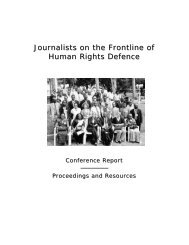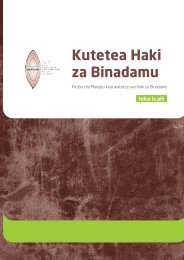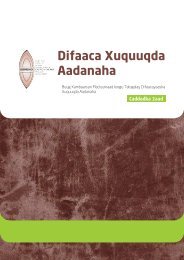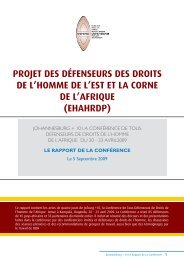Table of Contents - East and Horn of Africa Human Rights ...
Table of Contents - East and Horn of Africa Human Rights ...
Table of Contents - East and Horn of Africa Human Rights ...
You also want an ePaper? Increase the reach of your titles
YUMPU automatically turns print PDFs into web optimized ePapers that Google loves.
Regional Workshop on Women <strong>and</strong> Minority <strong>Human</strong> <strong>Rights</strong> Defenders<br />
Challenges faced by NHRIs in the promotion <strong>and</strong> protection <strong>of</strong> rights <strong>of</strong> women <strong>and</strong><br />
minority rights defenders<br />
These are quite many, but in the interest <strong>of</strong> time, I will mention at least three:<br />
1. Inadequate awareness <strong>of</strong> human rights: Although more people are aware <strong>of</strong> their rights more than<br />
ever before there is still a large number that are still unaware. Ignorance about human rights breeds<br />
discrimination <strong>and</strong> intolerance <strong>and</strong> the lack <strong>of</strong> respect for human rights principles. Moreover even<br />
when rights are violated such people are unaware that a right has been violated or that there are<br />
institutions where one can seek redress. This on the whole hampers any progress in the promotion<br />
<strong>and</strong> protection <strong>of</strong> human rights.<br />
2. <strong>Human</strong> <strong>Rights</strong> versus cultural traditions: Although most <strong>of</strong> the international human rights<br />
st<strong>and</strong>ards have been domesticated, enforcement <strong>of</strong> these st<strong>and</strong>ards is still hampered by cultural<br />
traditions that are detrimental to the human rights culture. For example, although the law provides<br />
for the equality <strong>of</strong> men <strong>and</strong> women with regard to human rights <strong>and</strong> fundamental freedoms in the<br />
political, economic, social, cultural, civil or any other field, women’s rights are yet to be fully<br />
realized. Discriminatory practices denying women their full enjoyment <strong>of</strong> human rights persist<br />
throughout the country promoted by some cultures which encourage demeaning practices to women<br />
like female genital mutilation, polygamy, rape, bride price etc.<br />
3. Implementation <strong>of</strong> decisions/orders/advice/recommendations: The Ug<strong>and</strong>a <strong>Human</strong> <strong>Rights</strong><br />
Commission has powers to make recommendations, give advice or make decisions <strong>and</strong> orders. The<br />
Ug<strong>and</strong>a <strong>Human</strong> <strong>Rights</strong> Commission still faces the challenge <strong>of</strong> ensuring that victims <strong>of</strong> human rights<br />
violations are paid the amounts awarded by the Tribunal as compensation in time. The Ug<strong>and</strong>a<br />
<strong>Human</strong> <strong>Rights</strong> Commission is in close contact with the Ministry <strong>of</strong> Justice to find ways to expedite<br />
payments <strong>and</strong> has also proposed having a victims’ compensation fund.<br />
4. Need for more coordination between NHRIs <strong>and</strong> CSOs involved in human rights work (<strong>Human</strong><br />
<strong>Rights</strong> Defenders) <strong>and</strong> also more co-ordination among the CSOs themselves since we are all working<br />
towards a common goal.<br />
Conclusion<br />
It is clear that the rights <strong>of</strong> <strong>Human</strong> <strong>Rights</strong> Defenders need to be promoted <strong>and</strong> protected <strong>and</strong> that<br />
National <strong>Human</strong> <strong>Rights</strong> Institutions have a role to play. Their role is closely linked to their functions <strong>of</strong><br />
complaints h<strong>and</strong>ling, research <strong>and</strong> human rights education, visiting places <strong>of</strong> detention to assess <strong>and</strong><br />
inspect conditions <strong>of</strong> the inmates, monitoring their government’s compliance with international<br />
instruments <strong>and</strong> making recommendations to government to improve the human rights situation in their<br />
respective countries. From our experience National <strong>Human</strong> <strong>Rights</strong> Institutions have to cooperate with<br />
other <strong>Human</strong> <strong>Rights</strong> Defenders. Furthermore, <strong>Human</strong> <strong>Rights</strong> Defenders have to st<strong>and</strong> up for each other<br />
when any <strong>of</strong> them comes under attack because they all have one purpose <strong>and</strong> goal which is to promote <strong>and</strong><br />
protect human rights.<br />
V Women <strong>Rights</strong> defenders in Ug<strong>and</strong>a; The FIDA-U Experience, Zahara Nampewo<br />
� Oldest women rights organization in Ug<strong>and</strong>a whose key m<strong>and</strong>ate is the welfare <strong>of</strong> women.<br />
� Is a membership organisation (lawyers <strong>and</strong> law students).<br />
� Uses law as a tool <strong>of</strong> social change.<br />
� Combines law <strong>and</strong> gender to foster the rights based approach to address the power imbalances <strong>and</strong><br />
abuses in society.<br />
� Art. 21 - Outlaws discrimination <strong>of</strong> all persons on any grounds<br />
� Art. 31 – Protects rights <strong>of</strong> the family including marriage<br />
41 | P a g e








